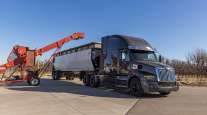Senior Reporter
February Class 8 Sales Jump as Demand Remains Strong

U.S. Class 8 retail sales for February rose 19% compared with a year ago to 19,858 vehicles, WardsAuto.com reported, underscoring that demand remains strong.
It was the highest volume for any February since 2006, when sales were 20,399 and fleets were facing more stringent emissions regulations coming in 2007.
“From a trend perspective, this is very much in line with what we have averaged over the last 12 months. All around, it’s a decent number,” said Steve Tam, vice president at ACT Research Co.

Year-to-date sales hit 40,050, up 28.6% from a year earlier, according to Wards.
Tam said he expects sales to continue to increase “at least until truckers decide their prospects are not as bright as they think they are today. And that time is coming. It’s just the magic question of when. We haven’t seen it yet.”
ACT’s full-year forecast for U.S. Class 8 retail sales is 258,500, he said; that is up 3% from 250,545 last year.
ACT pointed to still-strong carrier profits, desirable new technologies and better fuel economy as demand-side drivers.
The research firm FTR viewed February’s volume as not too high or too low, said Don Ake, vice president of commercial vehicles at FTR.
“It is pretty much right as you would expect it to be given that the market is growing and this is supposed to be a strong production and sales year,” said Ake.
Ake forecasts 2019 to be a record year “for a year not influenced by any pre-buy or regulation talk, any pull-forward stuff,” as happened in 2006.
“We don’t see anything severe or significant as long as the economy stays above 2% GDP, we are going to be in good shape,” he said.
Freightliner sat atop the market with a 40.4% share on sales of 8,018, or 27.1% higher compared with a year earlier.
Freightliner is a unit of Daimler Trucks North America.
“After a record breaking 2018, demand for Daimler Trucks North America vehicles remains high in the first months of 2019,” said Richard Howard, senior vice president of sales at DTNA. “In particular, we are seeing unprecedented levels of customer demand for our MY2020 new Cascadia coming off its successful launch at CES in January. Supported by continued good general economics and a positive business climate, we expect continued strong retail sales in 2019 for both heavy- and medium-duty vehicles.”
Western Star, also a DTNA brand, had a 1.9% share with 386 trucks, as sales rose 1.8% from the 2018 period.
Kenworth Truck Co. posted the highest gain in sales compared with a year earlier, rising 32.4% on sales of 2,780, earning a 14% share.
Kenworth and Peterbilt Motors Co. are brands of Paccar Inc.

Peterbilt notched a 15.3% share on sales of 3,029, which were 21.8% higher than the year before.
“Coming off a strong 2018, industry retail sales in the U.S. have started the year strong, up about 30% year-to-date,” said Peterbilt General Manager Jason Skoog. “Demand for Peterbilt trucks continues to be robust, and both stock and customer trucks are moving quickly through dealer inventory to the end user.”
International Truck, a unit of Navistar Inc., posted a 22.1% increase as sales rose to 2,739, good for a 13.8% market share.
International’s improved sales and market share have brought some “modest” improvements in pricing, Navistar executives said during a recent earnings conference call.
“We will continue to take price increases as appropriate, given the performance of our products in the market, and as we have to digest costs like commodities and such,” said Chairman and CEO Troy Clarke.
Much of the focus on Navistar’s call was related to dealer inventory levels, Michael Baudendistel, an analyst with Stifel, Nicolaus & Co., wrote in a note to investors.
“That had also been an issue on the prior two analyst calls given the visibly sharp uptick in U.S. and Canada [Classes-6-8] dealer stock [which at International has risen steadily since July 2018]. The point-counterpoint we have heard many times: is having a backlog at a high absolute level appropriate given that sales are at a commensurately high level?” he wrote.
Clarke underscored the importance of the inventory.
“As we’ve kind of gone through our turnaround, re-engaging the customers — that the dealers are the primary source of contact with — has been very important to us. And so trucks on the lot are very important basically to that,” Clarke said.
Meanwhile, Volvo Trucks North America saw sales drop 11.7% compared with a year earlier to 1,743 units, good for an 8.8% share.

Mack Trucks posted a 5.9% share on sales of 1,163, a decline of 2.6% from the 2018 period.
“Overall, Class 8 demand remained strong, with solid economic indicators and growing freight volumes and freight rates driving fleet profitability. Add to the equation a significant order backlog, and we anticipate that momentum to continue throughout the year,” said Jonathan Randall, Mack Trucks senior vice president of North American sales. “At Mack Trucks, we are delivering the products and solutions customers demand, including our Mack Anthem and Granite models.”
VTNA and Mack are brands of Volvo Group.
Other truck makers did not respond to a request for comments.




